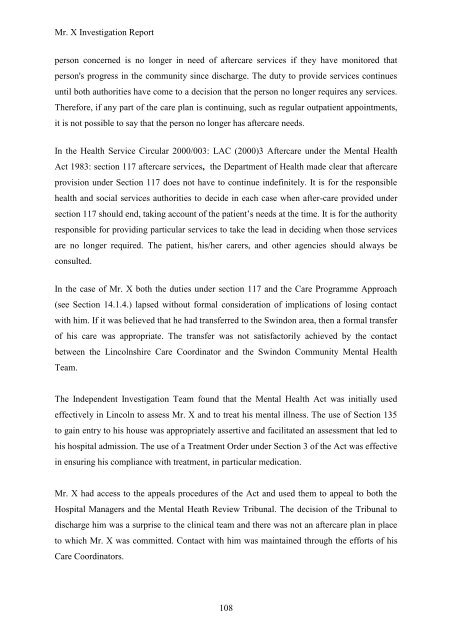- Page 1 and 2:
Mr. X Investigation Report Independ
- Page 3 and 4:
Mr. X Investigation Report Lincolns
- Page 5 and 6:
Mr. X Investigation Report 1. Inves
- Page 7 and 8:
Mr. X Investigation Report 2. Condo
- Page 9 and 10:
Mr. X Investigation Report the back
- Page 11 and 12:
Mr. X Investigation Report writing
- Page 13 and 14:
Mr. X Investigation Report Approach
- Page 15 and 16:
Mr. X Investigation Report 3.5. Fin
- Page 17 and 18:
Mr. X Investigation Report 2. Medic
- Page 19 and 20:
Mr. X Investigation Report 9. Care
- Page 21 and 22:
Mr. X Investigation Report Team fin
- Page 23 and 24:
Mr. X Investigation Report care and
- Page 25 and 26:
Mr. X Investigation Report social c
- Page 27 and 28:
Mr. X Investigation Report with loc
- Page 29 and 30:
Mr. X Investigation Report Recommen
- Page 31 and 32:
Mr. X Investigation Report bag were
- Page 33 and 34:
Mr. X Investigation Report 5. Backg
- Page 35 and 36:
Mr. X Investigation Report 6. Terms
- Page 37 and 38:
Mr. X Investigation Report Phase Tw
- Page 39 and 40:
Mr. X Investigation Report 8. Inves
- Page 41 and 42:
Mr. X Investigation Report Governan
- Page 43 and 44:
Mr. X Investigation Report July 200
- Page 45 and 46:
Mr. X Investigation Report 9 Septem
- Page 47 and 48:
Mr. X Investigation Report 8. Findi
- Page 49 and 50:
Mr. X Investigation Report When con
- Page 51 and 52:
Mr. X Investigation Report 24. Avon
- Page 53 and 54:
Mr. X Investigation Report 11. Prof
- Page 55 and 56:
Mr. X Investigation Report 12. Chro
- Page 57 and 58: Mr. X Investigation Report provided
- Page 59 and 60: Mr. X Investigation Report assessed
- Page 61 and 62: Mr. X Investigation Report treat Mr
- Page 63 and 64: Mr. X Investigation Report 29 Octob
- Page 65 and 66: Mr. X Investigation Report Social W
- Page 67 and 68: Mr. X Investigation Report photogra
- Page 69 and 70: Mr. X Investigation Report informed
- Page 71 and 72: Mr. X Investigation Report he had n
- Page 73 and 74: Mr. X Investigation Report Clinical
- Page 75 and 76: Mr. X Investigation Report 21 June
- Page 77 and 78: Mr. X Investigation Report contacte
- Page 79 and 80: Mr. X Investigation Report 13.3. Cr
- Page 81 and 82: Mr. X Investigation Report talk to
- Page 83 and 84: Mr. X Investigation Report case rem
- Page 85 and 86: Mr. X Investigation Report 14. Furt
- Page 87 and 88: Mr. X Investigation Report The diag
- Page 89 and 90: Mr. X Investigation Report Througho
- Page 91 and 92: Mr. X Investigation Report 14.1.1.2
- Page 93 and 94: Mr. X Investigation Report October.
- Page 95 and 96: Mr. X Investigation Report 14.1.2.
- Page 97 and 98: Mr. X Investigation Report himself
- Page 99 and 100: Mr. X Investigation Report own home
- Page 101 and 102: Mr. X Investigation Report Mr. X di
- Page 103 and 104: Mr. X Investigation Report Aftercar
- Page 105 and 106: Mr. X Investigation Report section
- Page 107: Mr. X Investigation Report suspicio
- Page 111 and 112: Mr. X Investigation Report „In th
- Page 113 and 114: Mr. X Investigation Report Mr. X‟
- Page 115 and 116: Mr. X Investigation Report support
- Page 117 and 118: Mr. X Investigation Report made. At
- Page 119 and 120: Mr. X Investigation Report 14.1.5.
- Page 121 and 122: Mr. X Investigation Report All serv
- Page 123 and 124: Mr. X Investigation Report reported
- Page 125 and 126: Mr. X Investigation Report engage,
- Page 127 and 128: Mr. X Investigation Report 2004-200
- Page 129 and 130: Mr. X Investigation Report behaviou
- Page 131 and 132: Mr. X Investigation Report previous
- Page 133 and 134: Mr. X Investigation Report between
- Page 135 and 136: Mr. X Investigation Report „a nee
- Page 137 and 138: Mr. X Investigation Report had no d
- Page 139 and 140: Mr. X Investigation Report Third: t
- Page 141 and 142: Mr. X Investigation Report team did
- Page 143 and 144: Mr. X Investigation Report Forensic
- Page 145 and 146: Mr. X Investigation Report 27 Febru
- Page 147 and 148: Mr. X Investigation Report possible
- Page 149 and 150: Mr. X Investigation Report Health A
- Page 151 and 152: Mr. X Investigation Report treatmen
- Page 153 and 154: Mr. X Investigation Report disorder
- Page 155 and 156: Mr. X Investigation Report 14.1.10.
- Page 157 and 158: Mr. X Investigation Report no oppor
- Page 159 and 160:
Mr. X Investigation Report within b
- Page 161 and 162:
Mr. X Investigation Report complian
- Page 163 and 164:
Mr. X Investigation Report 14.2.1.
- Page 165 and 166:
Mr. X Investigation Report practice
- Page 167 and 168:
Mr. X Investigation Report organise
- Page 169 and 170:
Mr. X Investigation Report unknown
- Page 171 and 172:
Mr. X Investigation Report Psychiat
- Page 173 and 174:
Mr. X Investigation Report of the D
- Page 175 and 176:
Mr. X Investigation Report assessme
- Page 177 and 178:
Mr. X Investigation Report a case t
- Page 179 and 180:
Mr. X Investigation Report Addition
- Page 181 and 182:
Mr. X Investigation Report 14.2.4.2
- Page 183 and 184:
Mr. X Investigation Report a lack o
- Page 185 and 186:
Mr. X Investigation Report physical
- Page 187 and 188:
Mr. X Investigation Report Swindon
- Page 189 and 190:
Mr. X Investigation Report would no
- Page 191 and 192:
Mr. X Investigation Report Unbeknow
- Page 193 and 194:
Mr. X Investigation Report services
- Page 195 and 196:
Mr. X Investigation Report 14.2.7.2
- Page 197 and 198:
Mr. X Investigation Report a clinic
- Page 199 and 200:
Mr. X Investigation Report 14.2.8.3
- Page 201 and 202:
Mr. X Investigation Report 14.2.10.
- Page 203 and 204:
Mr. X Investigation Report is also
- Page 205 and 206:
Mr. X Investigation Report The Prac
- Page 207 and 208:
Mr. X Investigation Report Should t
- Page 209 and 210:
Mr. X Investigation Report of Mr. X
- Page 211 and 212:
Mr. X Investigation Report August -
- Page 213 and 214:
Mr. X Investigation Report Causal F
- Page 215 and 216:
Mr. X Investigation Report acknowle
- Page 217 and 218:
Mr. X Investigation Report Probatio
- Page 219 and 220:
Mr. X Investigation Report he remai
- Page 221 and 222:
Mr. X Investigation Report that Avo
- Page 223 and 224:
Mr. X Investigation Report Avon and
- Page 225 and 226:
Mr. X Investigation Report on occas
- Page 227 and 228:
Mr. X Investigation Report 1. Categ
- Page 229 and 230:
Mr. X Investigation Report It is th
- Page 231 and 232:
Mr. X Investigation Report service
- Page 233 and 234:
Mr. X Investigation Report 16.4. St
- Page 235 and 236:
Mr. X Investigation Report Recommen
- Page 237 and 238:
Mr. X Investigation Report It is th
- Page 239 and 240:
Mr. X Investigation Report 2. Regis
- Page 241 and 242:
Mr. X Investigation Report given to
- Page 243 and 244:
Mr. X Investigation Report commissi
- Page 245 and 246:
Mr. X Investigation Report since be
- Page 247 and 248:
Mr. X Investigation Report linked s
- Page 249 and 250:
Mr. X Investigation Report Recommen
- Page 251 and 252:
Mr. X Investigation Report 2. Seek
- Page 253 and 254:
Mr. X Investigation Report Team. Th
- Page 255 and 256:
Mr. X Investigation Report Monitori
- Page 257 and 258:
Mr. X Investigation Report 20. Less
- Page 259 and 260:
Mr. X Investigation Report 21. Reco
- Page 261 and 262:
Mr. X Investigation Report a stable
- Page 263 and 264:
Mr. X Investigation Report Recommen
- Page 265 and 266:
Mr. X Investigation Report Quality
- Page 267 and 268:
Mr. X Investigation Report 21.1.7.
- Page 269 and 270:
Mr. X Investigation Report of the c
- Page 271 and 272:
Mr. X Investigation Report Contribu
- Page 273 and 274:
Mr. X Investigation Report followin
- Page 275 and 276:
Mr. X Investigation Report In 2009
- Page 277 and 278:
Mr. X Investigation Report team bri
- Page 279 and 280:
Mr. X Investigation Report administ
- Page 281 and 282:
Mr. X Investigation Report patient
- Page 283 and 284:
Mr. X Investigation Report Appendix
- Page 285 and 286:
Mr. X Investigation Report complace
- Page 287 and 288:
Mr. X Investigation Report Furtherm
- Page 289 and 290:
Mr. X Investigation Report Update M
- Page 291 and 292:
Mr. X Investigation Report Update M
- Page 293 and 294:
Mr. X Investigation Report In addit
- Page 295 and 296:
Mr. X Investigation Report Staff ar
- Page 297 and 298:
Date and Event time 2000 bedroom.
- Page 299 and 300:
Date and time 28/7/02 31/7/02 1/8/0
- Page 301 and 302:
Date and time 15/8/02 29/8/02 2/9/0
- Page 303 and 304:
Date and Event time 20/9/02 The App
- Page 305 and 306:
Date and time 20/9/02 - 28/10/02 17
- Page 307 and 308:
Date and time Event 20/11/02 The Ca
- Page 309 and 310:
Date and time 23/12/02 24/12/02 24/
- Page 311 and 312:
Date and time 21/1/03 21/1/03 22/1/
- Page 313 and 314:
Date and Event time 5/3/03 A letter
- Page 315 and 316:
Date and time Undated, possibly Jun
- Page 317 and 318:
Date and time 23/10/03 28/10/03 4/1
- Page 319 and 320:
Date and time 21/12/04 February 20
- Page 321 and 322:
Date and time 20/6/07 20/6/07 21/6/
- Page 323 and 324:
Date and Event time 10/7/07 A discu
- Page 325 and 326:
26.03.01 The Lincoln Forensic Psych
- Page 327 and 328:
30.09.02 2.10.02 6.11.02 27.11.02 H
- Page 329 and 330:
01.08.03 04.08.03 18.08.03 23. 10.0
- Page 331 and 332:
17-19 June 2007 19.06.07 21.06.07 D
- Page 333 and 334:
Diagram Showing Agencies Involved w
















